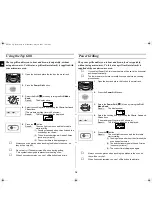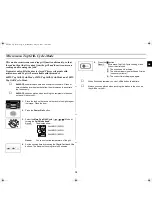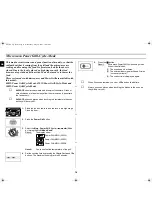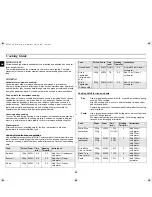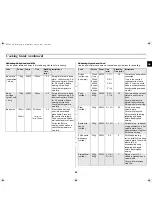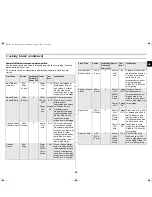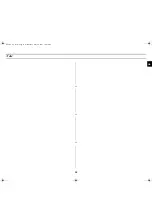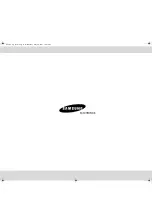
24
GB
Cooking Guide (continued)
REHEATING
Your microwave oven will reheat food in a fraction of the time that conventional
ovens hobs normally take.
Use the power levels and reheating times in the following chart as a guide. The
times in the chart consider liquids with a room temperature of about +18 to +20°C
or a chilled food with a temperature of about +5 to +7°C.
Arranging and covering
Avoid reheating large items such as joint of meat - they tend to overcook and dry
out before the centre is piping hot. Reheating small pieces will be more
successful.
Power levels and stirring
Some foods can be reheated using 900 W power while others should be reheated
using 600 W, 450 W or even 300 W.
Check the tables for guidance. In general, it is better to reheat food using a lower
power level, if the food is delicate, in large quantities, or if it is likely to heat up
very quickly (mince pies, for example).
Stir well or turn food over during reheating for best results. When possible, stir
again before serving.
Take particular care when heating liquids and baby foods. To prevent eruptive
boiling of liquids and possible scalding , stir before, during and after heating.
Keep them in the microwave oven during standing time. We recommend putting a
plastic spoon or glass stick into the liquids. Avoid overheating (and therefore
spoiling) the food.
It is preferable to underestimate cooking time and add extra heating time, if
necessary.
Heating and standing times
When reheating food for the first time, it is helpful to make a note of the time
taken - for future reference.
Always make sure that the reheated food is piping hot throughout.
Allow food to stand for a short time after reheating - to let the temperature even
out.
The recommended standing time after reheating is 2-4 minutes, unless another
time is recommended in the chart.
Take particular care when heating liquids and baby food. See also the chapter
with the safety precautions.
REHEATING LIQUIDS
Always allow a standing time of at least 20 seconds after the oven has been
switched off to allow the temperature to even out. Stir during heating, if
necessary, and ALWAYS stir after heating. To prevent eruptive boiling and
possible scalding, you should put a plastic spoon or glass stick into the
beverages and stir before, during and after heating.
REHEATING BABY FOOD
BABY FOOD:
Empty into a deep ceramic plate. Cover with plastic lid. Stir well after reheating!
Let stand for 2-3 minutes before serving. Stir again and check the temperature.
Recommended serving temperature: between 30-40°C.
BABY MILK:
Pour milk into a sterilised glass bottle. Reheat uncovered. Never heat a baby's
bottle with teat on, as the bottle may explode if overheated. Shake well before
standing time and again before serving ! Always carefully check the temperature
of baby milk or food before giving it to the baby. Recommended serving
temperature: ca. 37°C.
REMARK:
Baby food particularly needs to be checked carefully before serving to prevent
burns.
Use the power levels and times in the next table as a guide lines for reheating.
PG113UC_GB.fm Page 24 Wednesday, May 28, 2003 10:07 AM
Summary of Contents for PG113UC
Page 34: ...34 MA Nota PG113UC_MA fm Page 34 Wednesday May 28 2003 9 26 AM ...
Page 35: ...35 MA Nota PG113UC_MA fm Page 35 Wednesday May 28 2003 9 26 AM ...
Page 36: ...PG113UC_MA fm Page 36 Wednesday May 28 2003 9 26 AM ...
Page 69: ...33 CT d PG113UC_CT fm Page 33 Tuesday May 27 2003 5 27 PM ...
Page 70: ...34 CT d PG113UC_CT fm Page 34 Tuesday May 27 2003 5 27 PM ...
Page 71: ...35 CT d PG113UC_CT fm Page 35 Tuesday May 27 2003 5 27 PM ...
Page 72: ...PG113UC_CT fm Page 36 Tuesday May 27 2003 5 27 PM ...
Page 105: ...33 GB Note PG113UC_GB fm Page 33 Wednesday May 28 2003 10 07 AM ...
Page 106: ...34 GB Note PG113UC_GB fm Page 34 Wednesday May 28 2003 10 07 AM ...
Page 107: ...35 GB Note PG113UC_GB fm Page 35 Wednesday May 28 2003 10 07 AM ...
Page 108: ...PG113UC_GB fm Page 36 Wednesday May 28 2003 10 07 AM ...





